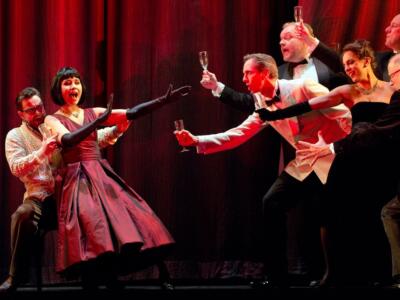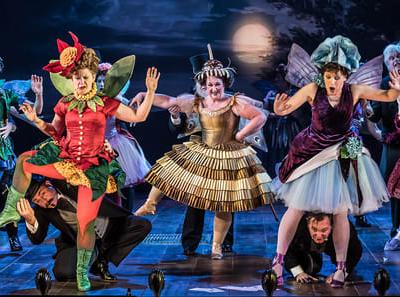Introduction to The Elixir of Love (L'elisir d'amore)
Written by Italian composer Gaetano Donizetti in 1832, The Elixir of Love (L’elisir d’amore) is a romantic opera. It combines humour, drama, and beautiful music to create a truly unforgettable experience.
An opera about Love - the story of The Elixir of Love (L'elisir d'amore)
As a wealthy and beautiful heiress, Adina enjoys the attention of many men. When the shy and awkward Nemorino expresses his love for her, she dismisses them. But, after Nemorino consumes a mysterious love potion – the Elixir in the title – he cools towards Adina. Intrigued, Adina begins to question her own feelings to him.
Video
A Love Potion
The opera sets up the idea of the love potion – the Elixir – with Adina telling everyone the story of Tristan and Isolde (Isuelt). This is a Celtic legend, from the 12th century, which has the two people take a love potion and then begin an affair. This story inspires Nemorino. He asks an enigmatic salesman calling himself Doctor Dulcamara if he has any Elixir.
Read the full synopsis (story) of The Elixir of Love (L’elisir d’amore)
Video
The History
Donizetti wrote over 70 operas in his lifetime. While others are also highly regarded, The Elixir of Love stands out as a masterpiece of its genre. The Elixir of Love is known as an opera buffa which is an Italian comic opera. These operas originated in Italy in the 18th century. They were all set among real people in their contemporary communities. They weren’t set among the elites or the gods.
Prolific Italian poet Felice Romani wrote the libretto for The Elixir of Love. He actually based it on the French opera Le philtre. Composer Daniel Auber and his librettist Eugène Scribe had premiered their opera only in previous year.
Video
Bel Canto
The Elixir of Love is described as a ‘Bel Canto’ opera. Translated as “beautiful singing”, the operas in this genre are all vocally demanding for singers. These operas can have very high notes and have intricate runs. Bel canto singers have to convey the full range of emotions through their singing.
This style fell out of favour as Verdi came along to dominate the Italian opera scene. Donizetti’s operas have plots that are often light and comedic. Verdi’s operas often have serious themes such as betrayal and political intrigue. Donizetti also favoured lyrical melodies and a focus on vocals. Verdi’s operas in contrast are more dramatic and emphasized the portrayal of strong characters and intense emotions.
Other composers who also wrote Bel Canto operas are fellow Italians Bellini and Rossini.
Video
A warm hug of a story - ENO's Version
Director Harry Fehr moves the opera from 19th century Italy into 1940s English equivalent. Framed as a TV sitcom episode, the production shows us life on a country estate during World War II where the workers was dominated by Land Girls.
He says “We’re giving this most Italian of pieces an English adaptation, presenting the story among the land girls, airmen, and impoverished aristocrats of a country estate in the early 1940s.
While poking fun at human vanity, it’s a warm hug of a story, filled with sunshine and laughter. Nemorino is anyone who has ever felt love from afar, and his funny and emotional journey towards happiness satisfies the romantic in all of us.”
Photo Gallery
More about Donizetti
Gaetano Donizetti had a prolific career, composing over 70 operas, with some of his most well-known works being Lucia di Lammermoor (1835), The Elixir of Love (1832), Don Pasquale (1843), and Anna Bolena (1830). Lucia di Lammermoor, inspired by Sir Walter Scott’s novel The Bride of Lammermoor, is a tragic tale of love and madness, and is particularly famous for its “mad scene,” a showcase of bel canto virtuosity.
Although he received no formal awards in his time, his legacy has been cemented through countless revivals of his operas, and several films and books have been inspired by or based on his works. Donizetti faced personal struggles, including mental health issues later in life, and his career ended prematurely when he suffered from a debilitating illness. Nonetheless, his operas remain central to the bel canto repertoire and are regularly performed worldwide.








